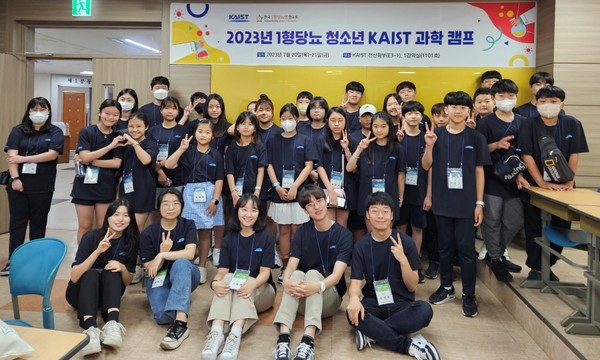In an effort to inspire physically challenged students to become the next generation’s leading scientists, KAIST hosted the “2023 KAIST Science Camp for Youth with Type 1 Diabetes” in collaboration with the Korean Society of Type 1 Diabetes last July 20 and 21. 32 young minds ranging from primary school 5th graders to high school juniors from all over the country participated in the camp. The event consisted of career mentoring led by the undergraduate student club K-Let, special lectures by faculty and graduate students, leadership programs, and lab tours.

Professor Hyun Wook Ka, a blind medical artificial intelligence researcher, gave a lecture titled, "Where Do Dreams Come From?" He emphasized that "dreams do not come from competing, comparing, and checking, but from asking the right questions about one's life and accepting and loving the small things in life," as he shared how he came to dream of becoming a scientist under the constraints of visual impairment.
Hye-Rin Park, a master's student in the School of Computing and the first person to enter KAIST with a severe disability, also shared with the young students her story of entering KAIST as an undergraduate in a wheelchair and becoming a graduate student under the theme of “Shine with your Specialness”.
The participants also gained first-hand experience of seeing and hearing science and technology at work for the benefit of people and the world. They visited the laboratories of Professor Kyoungchul Kong from the Department of Mechanical Engineering, who develops wearable robots that help people move; Professor Junyong Noh from the Graduate School of Culture Technology, who develops computer graphics technology used for video effects; and Professor Jennifer Hyunjong Shin from the Department of Mechanical Engineering, who studies the interaction of cells with physical stimuli to understand life and disease.
"Type 1 diabetes is a disease that requires patients to actively accept and utilize not only medical knowledge but also new medical and IT technologies to manage it," said Mi-young Kim, Kakao Impact Fellow and head of the Korean Society of Type 1 Diabetes. "I think this is a great opportunity for young people with type 1 diabetes to become interested in science and technology," she added.
In an interview with the participating K-Let members, they revealed that they were first introduced to the Korean Society of Type 1 Diabetes by Professor Sukyoung Ryu, Head of the School of Computing. K-Let had been conducting monthly online mentoring sessions through Zoom until an idea was raised to conduct an offline camp.
Meanwhile, the School of Computing, which was in charge of the camp, signed a business agreement with Kakao Impact in February to “develop technologies that contribute to social change”. In line with this, the CS492 Special Topics in Computer Science <Tech for Impact> class has been offered for this year’s fall semester to raise the students' interest in solving social problems and running projects that propose social applications of digital technology.
Type 1 diabetes is a chronic condition where the pancreas makes insufficient insulin, preventing sugar from entering the cells to produce energy. According to the Type 1 Diabetes Index, over 35,000 South Koreans are suffering from this autoimmune condition.

